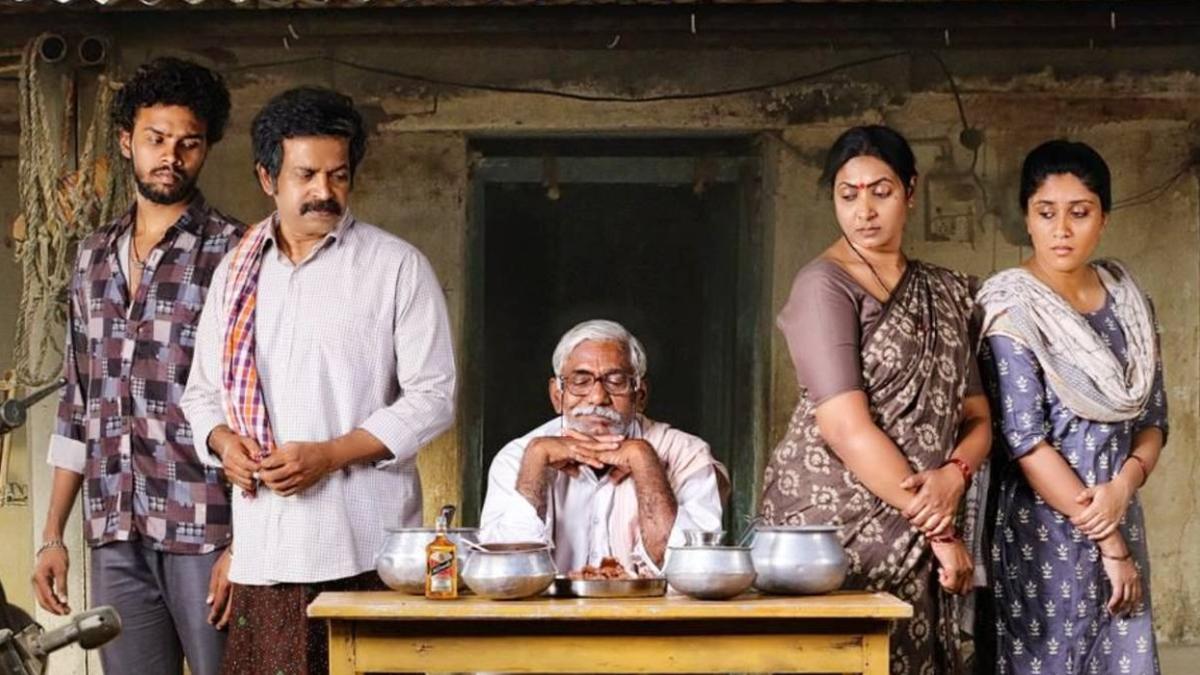
‘Baapu’ movie review: A tepid narrative that sparkles occasionally
The Hindu
Baapu - A Father’s Story, an indie Telugu drama, struggles to sustain interest despite strong performances and black comedy elements.
The premise of Baapu - A Father’s Story seems compelling on paper, but translating it into an engaging film is another challenge altogether. This indie-spirited Telugu drama, written and directed by Daya, unfolds in rural Telangana, aiming for a rollercoaster emotional family saga infused with black comedy. While the film remains committed to its core conflict and boasts seasoned actors like Brahmaji, Aamani, Sudhakar Reddy, and Dhanya Balakrishna delivering solid performances, it only shines in moments and often meanders without sustaining interest.
Sudhakar Reddy, known to audiences as Balagam’s thatha (grandfather), plays the titular baapu (father). The opening scenes swiftly establish his routine, subtly hinting at his growing forgetfulness — a recurring motif that propels the story forward at various junctures.
The elderly man’s son, Mallanna (Brahmaji), and daughter-in-law, Saroja (Aamani), cultivate cotton on a small plot of land. With the harvest season approaching, they are drowning in debt and must surrender most of their earnings to money lenders. Their son (Mani Aegurla) struggles to make ends meet as a driver of a dilapidated seven-seater auto, while their daughter, Varalakshmi (Dhanya Balakrishna), focuses on her studies, hoping to secure a government job.
Baapu takes time to find its rhythm. As characters and their aspirations unfold, the narrative remains predictable, unfolding largely on expected lines. The romance subplots of the younger characters run parallel to the broader family struggles, but they add little depth. The son’s love story lacks intrigue, with a twist that is all too obvious, while the daughter’s romantic arc is woefully underdeveloped.
The film shines when it leans into black comedy, particularly when the family devises a scheme to claim government aid of five lakh rupees — granted only upon a family member’s death. The ensuing discussions about life, death, and the absurdity of their predicament bring much-needed engagement. There is also a secondary subplot involving the search for a golden idol.
The setting, dialect, and slice-of-life portrayal of rural Telangana feel authentic but lack the vibrancy of films like Balagam or Mallesham.
Baapu is buoyed by strong performances. Often confined to supporting roles, Brahmaji makes the most of his lead role, delivering a measured and convincing performance — particularly in moments where he wrestles with guilt and affection for his father. Sudhakar Reddy brings effortless charm to his role, while Aamani remains reliable. Dhanya and Mani are competent in their limited parts, though Srinivas Avasarala is underutilised.

University of North Carolina System explores feasibility of setting up extension centre in Amaravati
APSCHE and University of North Carolina System explore collaboration opportunities for setting up extension centre in Amaravati.












